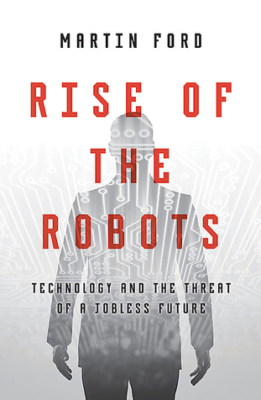Rise of the Robots: Technology and the Threat of a Jobless Future
 (Feb. 2017) I will never hear the phrase “jobs and the economy” again without thinking of this book. The steady advancement of technology into every aspect of our lives is slowly replacing much of our current labor force. There is no politician, no public policy, no regulatory voodoo or tax magic that is going “bring back jobs.” We need to stop believing that just because someone stands up and speaks those words that somehow they will be true.
(Feb. 2017) I will never hear the phrase “jobs and the economy” again without thinking of this book. The steady advancement of technology into every aspect of our lives is slowly replacing much of our current labor force. There is no politician, no public policy, no regulatory voodoo or tax magic that is going “bring back jobs.” We need to stop believing that just because someone stands up and speaks those words that somehow they will be true.
Here’s the truth: In a free market economy where technology continues to replace human labor, we cannot add jobs fast enough for the ones being eliminated. We continue to add people to the workforce but the jobs are literally disappearing.
Technology can perform routine tasks faster, more reliably and at less expense than human labor. The recession revealed this painful fact when huge numbers of white collar workers were laid off and never rehired. In the aftermath of the recession, companies have bounced back with greater earnings than before and with a SMALLER WORKFORCE. The job growth in communities across the country has been mostly in low wage service sectors.
Martin Ford puts together the data in a compelling and very readable format.
The bottom line is that, despite all the rhetoric about “job creators,” rational business owners do not want to hire more workers: they hire people only because they have to. The progression toward ever more automation is not an artifact of “design philosophy” or the personal preferences of engineers: it is fundamentally driven by capitalism. The “rise of ‘technology-centered automation'” that Carr worries about took place at least two hundred years ago and the Luddites were unhappy about it. The only difference today is that exponential progress is now pushing us toward the endgame. For any rational business, the adoption of labor-saving technology will almost invariably prove to be irresistible. Changing that would require far more than an appeal to engineers and designers: it would require modifying the basic incentives built into the market economy.
Continuing to replace people with technology produces a whole host of related issues. Goods and services might end up being cheaper to produce, but who will buy them? Creating communities of people barely able to subsist will not feed a huge American economy that depends on consumer spending.
And what about our current system of taxation based on individual income? . . . we ought to transition to a form of taxation that asks more from those businesses that rely heavily on technology and employ relatively few workers. We eventually will have to move away from the idea that workers support retirees and pay for social programs, and instead adopt the premise that our overall economy supports these things. Economic growth, after all, has significantly outpaced the rate at which new jobs have been created and wages have been rising.
The top 1% in this country continues to amass most of the wealth derived from that significant economic growth. Yet they cannot purchase and consume all the goods produced by better technology. This goes back to Henry Ford’s concept that you have to pay your workers enough to buy the goods they are producing. What happens when automation starts to replace both the people at the bottom of the labor forces as well as the professionals at the top?
. . . employment for many skilled professionals – including lawyers, journalists, scientists, and pharmacists – is already being significantly eroded by advancing information technology. They are not alone: most jobs are, on some level, fundamentally routine and predictable, with relatively few people paid primarily to engage in truly creative work or “blue-sky”thinking.
Ford gives many examples of how the pursuit of ever better technology driven by advancing Artificial Intelligence (AI) will ultimately provide not only a cheaper and faster way of providing goods and services, but also a more accurate and reliable end product. One of his predictions focuses on the radiologists who read scans. He predicts that at some point, technology will do it more reliably than humans.
We are truly stuck in an old paradigm. This is not going to serve us well going forward. There is technology right now – today – that writes articles for major publications. We consume that journalism without realizing it’s computer generated. What else are we consuming regularly that is produced by machine and not man?
I highly recommend this book. It will upend what you believe you know about how our economy works.